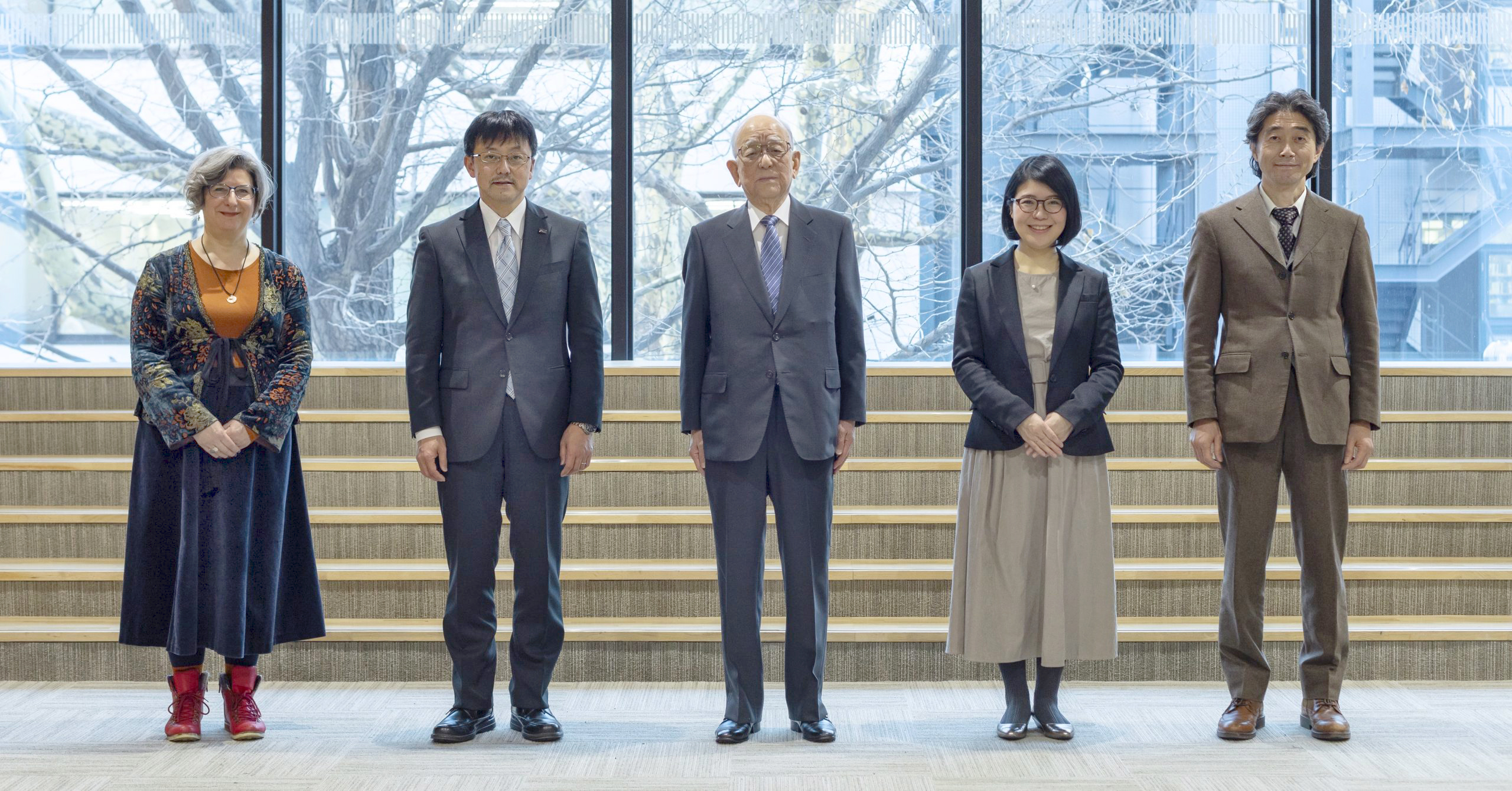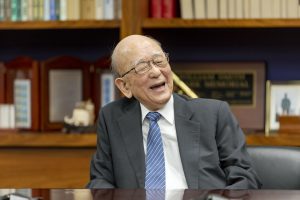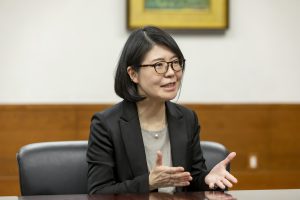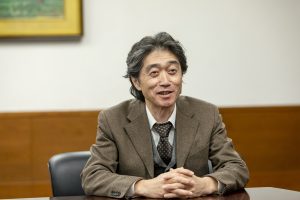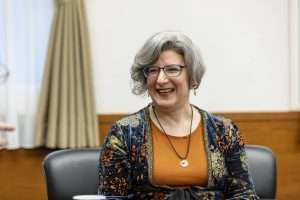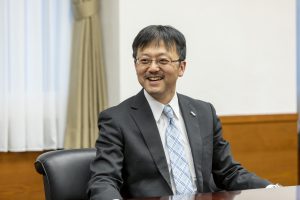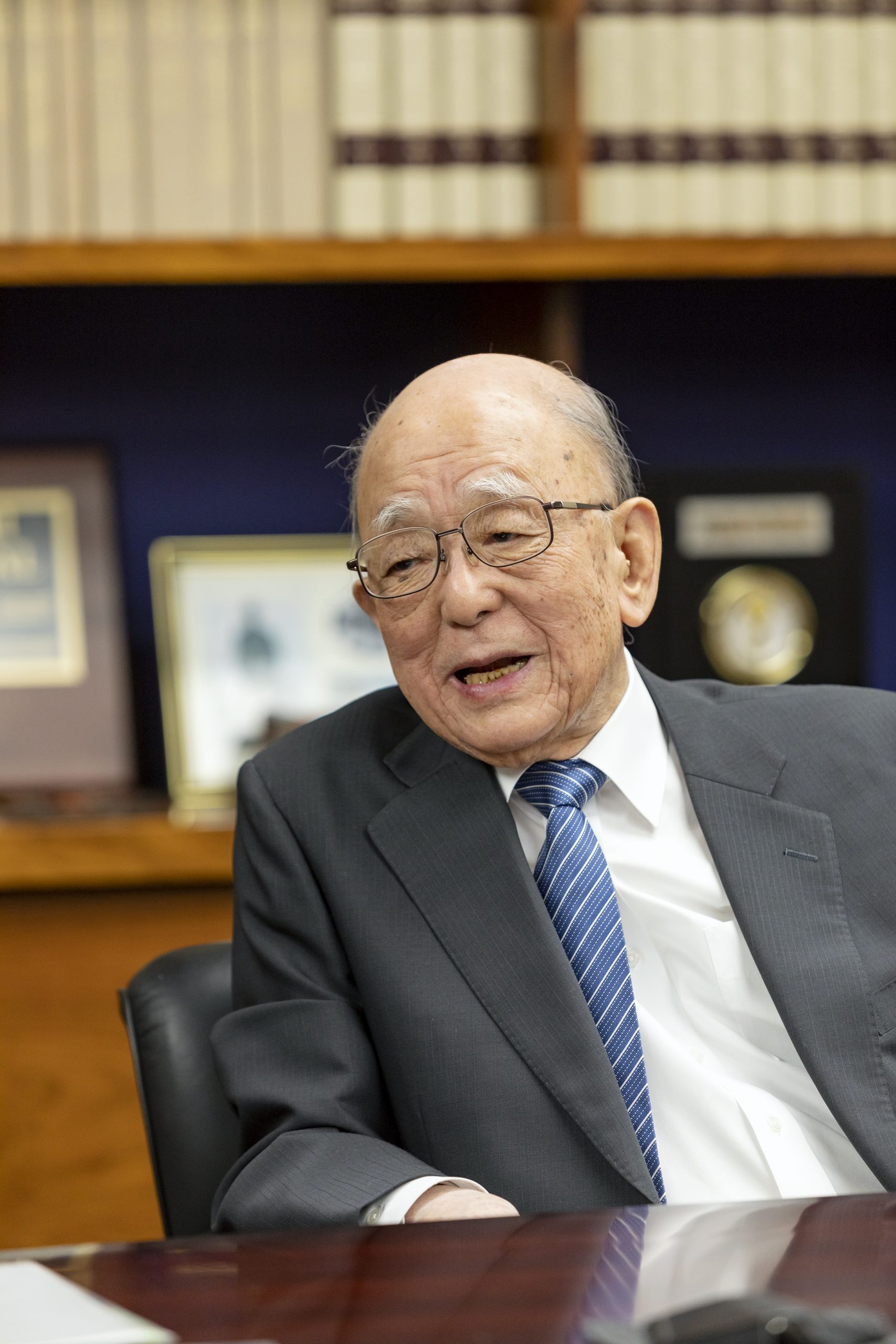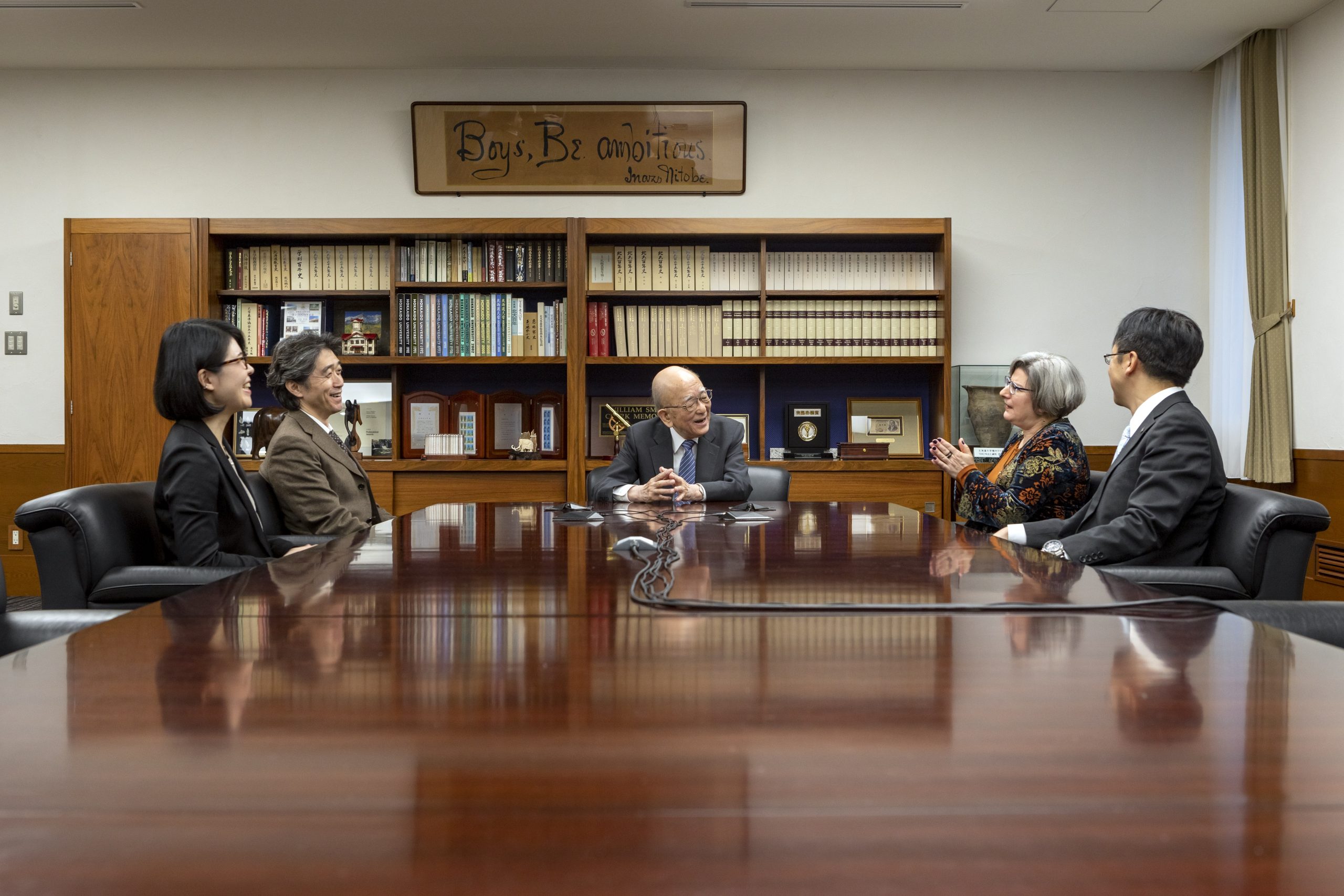Exploring the possibilities of Hokkaido University: Interview with a Pioneer
University News | April 21, 2021
This interview with Akira Suzuki, Nobel Laureate and Professor Emeritus at Hokkaido University, was published in the Spring 2020 issue of Litterae Populi. The full interview can be found here.
It has already been ten years since Hokkaido University Professor Akira Suzuki received the Nobel Prize in Chemistry. During this decade, the university has steadily promoted university reform to contribute to the solution of global issues as a base for creation, transmission and demonstration of knowledge. Researchers at the university who lead this reform talked about the present and future of the university with Akira Suzuki who is still active in lecture activities both in Japan and abroad.
- Akira Suzuki (Guest)
-
Akira Suzuki
University Professor, Professor Emeritus
Doctor of Science. Graduated from the School of Science and completed the doctoral course of the Faculty of Science of Hokkaido University. Appointed to be an assistant at the School of Science of Hokkaido University in 1959. After serving as an assistant professor at the School of Engineering, appointed to be a professor at the School in 1973. Active in lecture activities both in Japan and abroad even after retiring from Hokkaido University in 1994.
Received the Nobel Prize in Chemistry in 2010 for studies on the Suzuki Cross Coupling chemical reaction for binding between organic materials using a palladium catalyst and a base (1979). Suzuki Coupling has contributed greatly to the development and mass production of familiar products in daily life, such as drugs and pesticides, as well as liquid crystal and organic electroluminescence (EL) essential for IT devices.
- Interviewers
-
Asato Kuroiwa
Professor, Faculty of Science
Doctor (agriculture). Specializes in biological science. Graduated from the School of Agricultural Science, Nagoya University. After completing the doctoral course of the Graduate School of Bioagricultural Science at Nagoya University, served as a special researcher with the Japan Society for the Promotion of Science (JSPS). Appointed to be a lecturer at the Center of Advanced Science and Technology, Hokkaido University, in 2003. Appointed to current position in 2016. Now promoting public relations activities of the university as Advisor to the President (in charge of the Executive Committee for Public Relations).
Akinori Takaoka
Professor, Institute for Genetic Medicine (IGM)
Doctor (medicine). Specializes in immunology. Graduated from the School of Medicine and completed the doctoral course of the Graduate School of Medicine, Sapporo Medical University. After serving as an assistant professor and lecturer at the University of Tokyo, appointed to be professor of the Institute for Genetic Medicine (IGM), Hokkaido University (current position) in 2007. Served as the Director of the IGM for four years from 2012. Is active in contributing to society through various activities, including lecture visits to kindergartens.
Michelle Kay La Fay
Associate Professor, Faculty of Humanities and Human Sciences Doctor (Philosophy).
Specializes in religious studies. Graduated from McPherson College (USA). Completed the doctoral course of Hokkaido University Graduate School of Letters. After serving as an associate professor of Hokkaido University of Education, appointed as a specially appointed associate professor of Hokkaido University Graduate School of Letters (present Faculty of Humanities and Human Sciences) in 2014. Appointed to current position in 2016. Promoting internationalization of the university as Advisor to the President (in charge of the Center for International Education and Research).
Hajime Ito
Professor, Faculty of Engineering
Doctor (engineering). Specializes in organic chemistry. Graduated from the Faculty of Engineering, Kyoto University. After completing the doctoral course at the university’s Graduate School of Engineering, worked as an assistant professor at Tsukuba University and the Institute for Molecular Science of the Okazaki National Research Institutes. Appointed as an associate professor of the Hokkaido University Faculty of Science in 2002. Appointed to current position in 2010. Conducting world-leading research as the Deputy Director of the Institute for Chemical Reaction Design and Discovery (ICReDD).
Kuroiwa: Today, I’m going to proceed with the discussion under the themes of education, research, and regional contribution, which are the missions of our university. First, let’s talk about “education.” In these times of rapid internationalization, Hokkaido University offers a diverse range of education programs. Dr. La Fay, you are engaged in international education as an advisor to the president. What kind of classes do you usually teach?
Progress made towards the internationalization of education
La Fay: I teach international exchange subjects where international and Japanese students can take classes together in English. In group discussions held during these classes, students with different cultural backgrounds and points of view exchange various opinions.
Suzuki: It’s very important for both international and Japanese students to raise their levels of cultural understanding.
La Fay: Our program “Nitobe College” is also very appealing.
Suzuki: What is it like?
La Fay: It is a cross-departmental education program offered by Hokkaido University. It aims to give students the ability to play active roles as true leaders in global society by studying overseas and engaging in dialogue with alumni who have extensive international experience.
Suzuki: It sounds intriguing. I would love to be part of that program if I was younger.
Takaoka: It’s an outstanding program. All four basic philosophies of the university: “Frontier Spirit,” “Global Perspectives,” “All-round Education” and “Practical Learning” can be achieved by studying at Nitobe College. It’s such a good curriculum that it should be open for all students of Hokkaido University.
La Fay: Since students participate and study in groups with students from other departments, they can engage in discussions transcending the framework of their own specialties.
Takaoka: It’s a perfect example of “cross-coupling” of departments.
Suzuki: Japanese students are shy like I was back in the day. It’s great that they study earnestly and are very enthusiastic, but they are shy and lack aggressiveness. It’s a shame because they are not at all inferior to their counterparts around the world.
Ito: In my lab, graduate students in the doctoral course are sent overseas to study and research for several months. This enables them to communicate freely in English and gain extensive experience.
Suzuki: It’s wonderful to give them an opportunity like that.
Ito: It’s a real pity that success in job hunting is the ultimate goal of college life for many students.
Suzuki: It’s always been like that.
Ito: I don’t like the phrase “cost performance.” Spending your time at college with the idea of taking as few classes as possible and getting good grades with as little effort as possible seems to be a waste in the long run. I want students to realize that the university can bring them life-enriching knowledge and encounters.
La Fay: I want them to have room to breathe without worrying too much about “cost performance.”
Takaoka: It’s a problem on the student side, but teachers also need more ingenuity and should consider how to make college life more attractive. They have to provide the proper environment for it.
Suzuki: Having broad-minded ideas leads to the development of creativity. I hope students will make the most of the university’s education programs and improve themselves with such ideas.
Toward the future of interdisciplinary research
Kuroiwa: Let’s move on to the next theme, “research.” The Institute for Chemical Reaction Design and Discovery (ICReDD), for which Dr. Ito serves as deputy director, is one of the world’s foremost research projects being promoted by the university. Could you tell us about this project, Dr. Ito?
Ito: It was launched in October 2018 as a project under the World Premier International Research Center Initiative (WPI) of the Ministry of Education, Culture, Sports, Science and Technology (MEXT). Partly thanks to Dr. Suzuki, institutes in Japan and other countries have formed a team focused on “chemistry,” which is one of the strengths of our university; and are taking on research that merges the three academic fields of computational science, information science and experimental science.
Takaoka: Research styles have changed greatly from the days when Dr. Suzuki was in active service. Twenty to thirty years ago, big discoveries were like treasures which remained hidden and the main goal was to find them. However, now that most treasures have already been discovered, it is important for us to think about how we can connect these treasures to make new discoveries.
Ito: Joint research and diversity are very important.
Takaoka: Exactly. Interdisciplinary research is incredibly important. In that sense, our university has an advantage. Since almost all departments are centrally located on one campus, it is easy to sow the seeds of interdisciplinary research. I hold cross-departmental symposiums to facilitate exchange among researchers. The number of participants is increasing every year, and they are actively exchanging opinions.
La Fay: It’s useful for expanding networks of not only students but also researchers.
Suzuki: Hokkaido University is tremendously privileged to have an environment that facilitates the provision of new types of education and effective research. This presents us with a wide range of possibilities.
Kuroiwa: I study the mechanism of how the sex of animals is determined. Unlike other animals, the sex and gender of humans are closely related. However, since gender is not my specialty, I teach inter-graduate school classes with teachers from humanities departments. Our future goal is the fusion of humanities and sciences in research. This may be possible at our university.
Takaoka: Globalization is necessary, but localization is also crucial. I believe it is vital to go out into the world after solidifying a firm base.
Ito: We can be influenced by researchers from different fields and gain new ideas by talking with them. We may still be able to find treasures that have remained buried.
Suzuki: I was in the United States for a little over two years, but the research that won the Nobel Prize was conducted exclusively at Hokkaido University. Since I studied for nine years as a student of the School of Science before becoming a teacher, I benefited significantly from Hokkaido University. I want it to be a university that is not only recognized in Japan but also internationally, and one that is capable of making global contributions.
Takaoka: I think students and researchers are highly inspired by the achievements of Dr. Suzuki.
Suzuki: I’m very pleased to hear that. I think everyone has a fair chance to win the Nobel Prize. Since Hokkaido University has excellent researchers and students as well as an environment to promote interdisciplinary research, I hope they will pursue unprecedented research.
Significance of the university’s existence
Kuroiwa: Let’s move on to the next theme, “regional contribution.” I want to hear a story from Dr. Takaoka, who is engaged in a unique activity.
Takaoka: I make lecture visits to kindergartens and daycare centers. What inspired me was a report that I came across in 2015 about an international survey on learning achievement levels called PISA (Programme for International Student Assessment) promoted by the Organization for Economic Cooperation and Development (OECD). PISA assesses competencies of first-year high school students in three areas every three years: reading, mathematical literacy, and scientific literacy. In that year, Japan was clearly number one.
Kuroiwa: Japanese high school students have a good understanding of science.
Takaoka: Unfortunately, however, in the survey on the level of interest in science, Japan ranked seventh from the bottom out of about 70 target countries.
Suzuki: You would think they find it interesting.
Takaoka: I view it as the effect of cramming for entrance exams. I think many students learn just to pass exams without having much real interest. That’s why I started going on lecture visits, thinking it would be good to teach impactful and interesting science to four-year-old children who will remember what they learn and still have flexible brains. It is the training of “super-young talents” rather than “young talents.”
Suzuki: Are the children interested?
Takaoka: They really are. They are so excited. As they cannot read yet, I show them 70 slides, which you can tell they enjoy from the stars in their eyes.
Suzuki: That’s effective!
Takaoka: Part of the significance of our university’s existence is based on the extent to which we can contribute to society. I think it is important for university teachers who actually engage in quality education and research to be involved in the education of children.
Kuroiwa: I sometimes teach high school and junior high school students in lecture visits and lab visits, but not children in kindergarten or daycare centers. I think it’s a very novel approach.
Suzuki: It’s a fascinating effort. I hope this will lead to children entering Hokkaido University in the future.
Encounter with two books
Kuroiwa: What were you like when you were a child, Dr. Suzuki?
Suzuki: I’ve liked mathematics since my childhood. I liked the simplicity of there only being one answer to a question. I wanted to study mathematics in the School of Science and become a math teacher. I think life would have been just as fun if I had followed that path. But a book titled “Organic Chemistry” that I found when I entered university made me decide to change my career path to chemistry.
La Fay: I know that book. It’s a very thick one.
Suzuki: It is a very famous book in the United States. All students were studying with this book. Then, after I became a teacher at Hokkaido University, I found a book titled “Hydroboration” at a bookstore. It was a book about how to make organic boron compounds, which are compounds of boron and other organic molecules. I read the book and found it to be very interesting. I stayed up all night to read it. It is actually the only book I have stayed up all night to read in my life. Then, I decided to study under the author, Dr. Herbert C. Brown, and entered Purdue University (Indiana, USA). If I hadn’t encountered these two books, I wouldn’t have chosen a career in chemistry or received the Nobel Prize.
Kuroiwa: Those are wonderful encounters. I admire your ability to take action and start studying overseas because of a book.
Ito: It signifies Dr. Suzuki’s strong will to pursue originality.
Suzuki: It is up to yourself to decide how to pursue originality.
Kuroiwa: Lastly, could you leave us with a message for students?
Suzuki: When I was a student, there were no opportunities to talk to people from other countries unless you were studying overseas. Today, there are many opportunities to communicate with international students. I hope students will value their encounters with others and take advantage of various experiences to make the most of their college life.
Kuroiwa: Thank you very much for today.
This interview with Akira Suzuki, Nobel Laureate and Professor Emeritus at Hokkaido University, was published in the Spring 2020 issue of Litterae Populi. The full interview can be found here.

